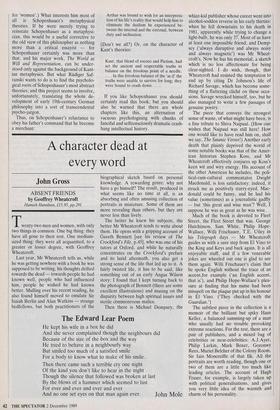A character dead at
every, word
John Gross
ABSENT FRIENDS by Geoffrey Wheatcroft
Hamish Hamilton, £15.95, pp.29I
Twenty-two men and women, with only two things in common. One big thing: they have all gone to their rest. One medium- sized thing: they were all acquainted, to a greater or lesser degree, with Geoffrey Wheatcroft.
Last year, Mr Wheatcroft tells us, while he was getting nowhere with a book he was supposed to be writing, his thoughts drifted towards the dead — towards people he had known well, people who had influenced him, people he wished he had known better. Mulling over his recent reading, he also found himself moved to emulate Sir Isaiah Berlin and Alan Watkins — strange bedfellows, but both practitioners of the biographical sketch based on personal knowledge. A rewarding genre: why not have a go himself? The result, produced in what seems like no time at all, is an absorbing and often amusing collection of portraits in miniature. Some of them are more revealing than others, but they are never less than lively.
The better he knew his subjects, the better Mr Wheatcroft tends to write about them. He opens with a gripping account of Gareth Bennett [see his review of The Crockford's File, p.451, who was one of his tutors at Oxford, and while he naturally concentrates on the Crockford's preface and its lurid aftermath, you also get a strong sense of the life that led up to it. A fairly twisted life, it has to be said, like something out of an early Angus Wilson story: I found that I kept turning back to the photograph of Bennett (there are some excellent illustrations) and musing on the disparity between high spiritual issues and sterile commonroom malice.
Then there is Michael Dempsey, the
whizz-kid publisher whose career went into alcohol-sodden reverse in his early thirties: when he fell downstairs to his death in 1981, apparently while trying to change a light-bulb, he was only 37. Most of us have at least one impossible friend, and Demp- sey (`always disruptive and always noisy and always magnetic') was Mr Wheat- croft's. Now he has his memorial, a sketch which is no less affectionate for being clear-sighted. 1 do wish, though, that Wheatcroft had resisted the temptation to end up by citing Dr Johnson's life of Richard Savage, which has become some- thing of a flattering cliche on these occa- sions. Savage wrecked himself, too, but he also managed to write a few passages of genuine poetry.
The piece that conveys the strongest sense of waste, of what might have been, is a fine tribute to Shiva Naipaul. (How one wishes that Naipaul was still here! How one would like to have read him on, shall we say, The Satanic Verses!) Another early death that plainly deprived the world of some notable books was that of the Amer- ican historian Stephen Koss, and Mr Wheatcroft effectively conjures up Koss's keen wit and wiry energy. His account of the other American he includes, the poli- tical-cum-cultural commentator Dwight Macdonald, is less satisfactory: indeed, it struck me as positively starry-eyed. Mac- donald could be funny, and he had his value (sometimes) as a journalistic gadfly — but 'this great and wise man'? Well, I suppose he was as great as he was wise.
Much of the book is devoted to Fleet Street, the Fleet Street that was. George Hutchinson, Sam White, Philip Hope- Wallace, Willi Frischauer, T.E. Utley in his Telegraph days — Mr Wheatcroft guides us with a sure step from El Vino to the King and Keys and back again. It is all enjoyable stuff, and if a few venerable jokes are wheeled out one is glad to see them again. Willi Frischauer's claim that he spoke English without the trace of an accent,for example Can English accent, that is'), and Philip Hope-Wallace's plea- sure at finding that his name had been misspelt on the plaque put up in his honour in El Vino. (`They checked with the Guardian.') The subtlest piece in the collection is a memoir of the brilliant but spiky Hans Keller, a balanced summing-up of a man who usually had no trouble provoking extreme reactions. For the rest, there are a pair of publishers; and a mixed bag of celebrities or near-celebrities: A.J.Ayer, Philip Larkin, Mark Boxer, Goronwy Rees, Muriel Belcher of the Colony Room, Sir lain Moncreiffe of that Ilk. All the portraits are worth reading, though one or two of them are a little too much like leading articles. The account of Hugh Fraser, for example, is largely taken up with political generalisations, and gives you very little idea of the warmth and charm of his personality.










































































 Previous page
Previous page